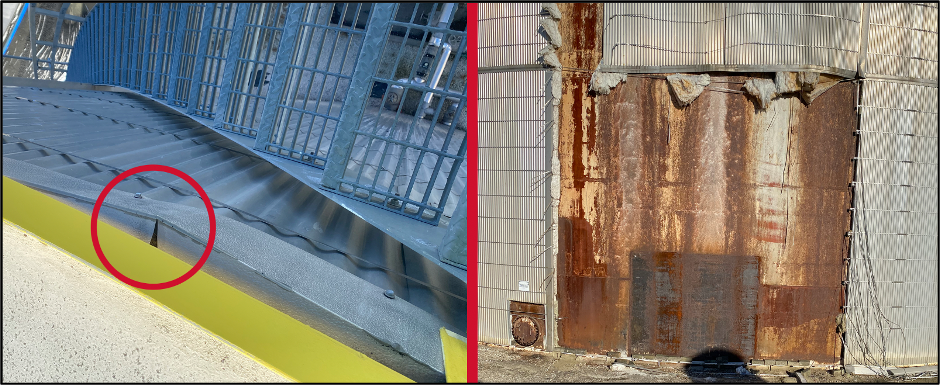To run a safe and efficient industrial facility, personnel within these facilities develop guidelines and procedures to mandate methods for construction, maintenance, and processes. In addition to these internal protocols, organizations like the American Petroleum Institute (API) and the Association for Materials Protection and Performance (AMPP, formerly NACE) establish best practices that can give direction to those personnel. API maintains more than 800 standards and recommended practices, many of which have been incorporated into state and federal regulations. AMPP members and representatives are dedicated to advancing technical and practical expertise in corrosion prevention and control. Some of these standards deal with asset integrity and all the factors that impact that integrity, including inspectability, corrosion, and insulation. Insulation can have a wonderful benefit for facilities with respect to energy savings and CO2 emissions reduction, but certain kinds of insulation can cause adverse effects like CUI that need to be constantly remediated to keep the facility, equipment, and personnel safe.
*Please note that we are not allowed to share the documents referenced below, but we will be linking to the pages where they can be purchased.
Mascoat Industrial-DTI thermal insulating coating has been used to save energy and protect personnel in refineries and petrochemical plants since 1995. As the experts on insulating coating technology and the best way to implement the coatings, our goal is to educate end users and engineering firms on how Mascoat Industrial-DTI is relevant to specific standards.
Just recently, Mascoat technical staff helped API recognize thermal insulating coatings as a type of insulation material in the API RP 583 standard. This document covers the design, maintenance, inspection, and mitigation practices for pressure equipment, piping, and storage tanks due to external corrosion under insulation (CUI) and fireproofing. With thermal insulating coatings like Mascoat Industrial-DTI, substrates on industrial equipment have a significantly reduced risk of CUI due to the coating's direct bond with the substrate or primer. Essentially, there is no internal environment where corrosion can begin, which allows the coating to need little-to-no maintenance for more than 25 years as shown in real-world applications on the US Gulf Coast and other humid, storm-prone areas. With the standard updated, it continues to show that there is no one-size-fits-all thermal insulation solution and that facilities, pieces of equipment, and operations may have to address different needs and conditions. Facilities need to take multiple factors into account when selecting insulation and other materials. This standard also echoes the viewpoint of AMPP, which listed a similar statement in 2017 about insulating coatings in SP0198-2017.
Another standard, API RP 580, outlines and explains the basic elements for developing, implementing, and maintaining a credible risk-based inspection (RBI) program. These programs can identify risks that will become the focus of inspections in addition to alternatives to inspection. For example, the removal of unnecessary traditional insulation will reduce the probability of corrosion under insulation. This can be helpful when it comes to maintenance concerns, but then the facility is losing valuable energy and contributing more emissions to keep the process running. However, implementing an insulating coating like Mascoat Industrial-DTI can also have the same effect without the lost energy savings or increased risk of surface contact burns.
Additionally, the ability to visually inspect Mascoat Industrial-DTI allows you to identify points of failure (POFs) sooner than you would be able to when traditional insulation and jacketing are involved. The RP 580 standard states that failures may be unannounced and undetected at the instant of occurrence (unannounced failure). For example, a slow leak under insulation may not be detected until a pool of fluid forms on the ground, someone notices a drip or wisp of vapor or even a catastrophic failure.
Other standards can expand into more detail for specific types of equipment. API 653 is a standard that covers the inspection, repair, alteration, and reconstruction of steel aboveground storage tanks used in the petroleum and chemical industries. This standard recommends that insulated tanks need to have insulation removed only to the extent necessary to determine the condition of the exterior wall of the tank or the roof. Depending on the size of the storage tank, this may mean significant portions of insulation need to be removed to determine the extent of hidden corrosion beneath the traditional insulation material. As mentioned before, an insulating coating like Mascoat Industrial-DTI allows the entire piece of equipment to be visually inspected as the risk of CUI is minimal, so there is no need to remove the coating.
Mascoat's technical personnel have been specifying industrial projects for over 25 years, with the primary focus being the right product for the right job. As shown within the standards above and the other thousands of standards from various organizations in multiple industries is that education is key. Mascoat's goal is to only recommend our product where it is a proper fit and benefits the end user. Additionally, by maintaining involvement within these organizations, Mascoat stays up-to-date on recommendations and obtains helpful feedback from professionals within the many industries our products are being utilized. Contact us to discuss how to bring your facility up to date,
Mascoat also has developed a Tank Insulation Design Guide that was developed to show how insulating coatings can be used by themselves or in conjunction with other insulating technologies to provide a balance of energy retention needs along with maintenance and corrosion concerns. You can read about one such hybrid system in this article. To request a copy of the Tank Insulation Design Guide, please contact Mascoat today.



